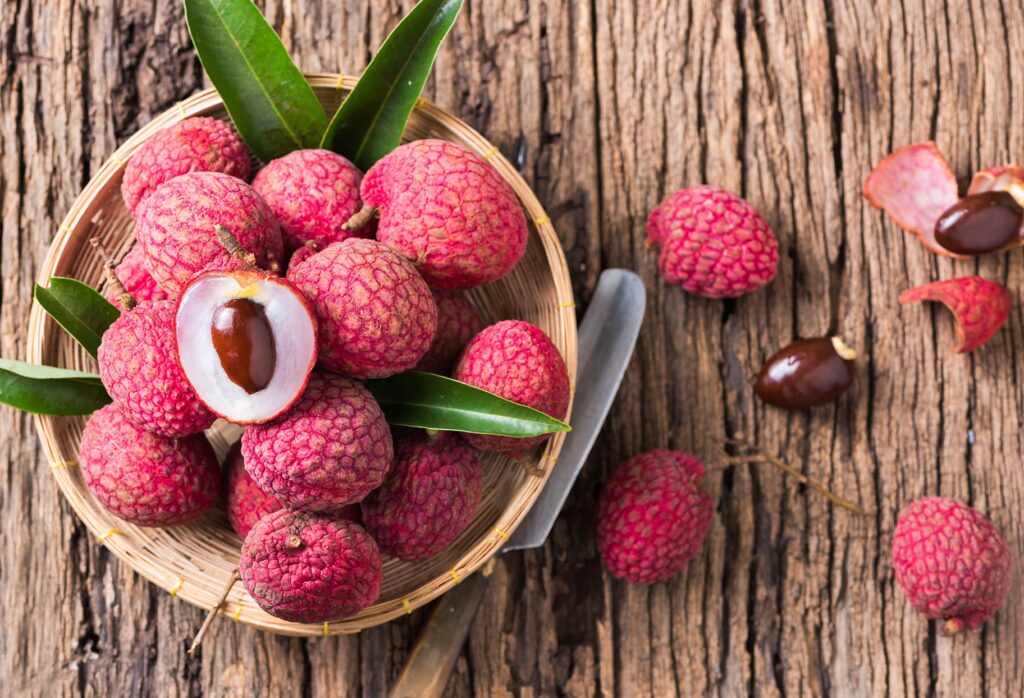Lychee, a tropical fruit native to Southeast Asia, has gained popularity worldwide for its unique appearance and enticing aroma. With its rough, reddish-brown skin and translucent white flesh, this fruit is as visually captivating as it is delicious. But what does lychee taste like? This blog post will delve into the intricate flavors and textures that make lychee a true culinary delight.
What Is Lychee?
Lychee is a tropical fruit native to Southeast Asia and belongs to the soapberry family. It has a rough, textured outer skin, typically red or pink. The fruit is small, round, and contains a translucent white flesh that is juicy and sweet. Lychee has a unique flavor profile, often combining floral, citrus, and grape-like notes. It is commonly consumed fresh but can also be used in various culinary applications such as desserts, drinks, and sauces. Lychee is rich in vitamin C, antioxidants, and other beneficial compounds, contributing to its potential health benefits.
It is important to note that while lychee is generally safe to consume, some individuals may experience allergic reactions or digestive issues when consuming excessive amounts or if they have pre-existing allergies. Therefore, it is recommended to consume lychee in moderation and consult with a healthcare professional if any concerns arise.
Explore More Topics For Taste Like
Where Does Lychee Come From?
Lychee, scientifically known as Litchi chinensis, is a tropical fruit that originates from Southeast Asia. It is believed to have originated in southern China, northern Vietnam, and Myanmar (Burma). The fruit has been cultivated in these areas for thousands of years and holds cultural significance in various Asian countries. Today, lychee is grown in several countries with suitable climates, including China, India, Thailand, Vietnam, and the Philippines. It thrives in warm and humid conditions and requires a subtropical climate to grow successfully. The fruit is highly valued for its sweet and fragrant flavor, juicy flesh, and unique texture.
What Does Lychee Taste Like?

Lychee is a tropical fruit known for its unique and distinct flavor. When you bite into a lychee, you will experience a burst of sweetness with hints of floral and tropical notes. The taste can be described as combining juicy grapes, fragrant roses, and a touch of pear. The texture of the fruit is soft and succulent, similar to a grape, but with a slightly firmer and jelly-like consistency. Overall, lychee offers a delightful and refreshing sweet and aromatic taste.
Lychee Benefits
Lychee, scientifically known as Litchi chinensis, is a tropical fruit highly regarded for its delicious taste and numerous health benefits. This small, round fruit is native to Southern China but is now cultivated in various parts of the world due to its popularity.
In this comprehensive response, we will delve into lychee’s various benefits for our overall well-being.
- Rich in vitamin C, which boosts the immune system and promotes collagen production for healthy skin
- Contains antioxidants that help protect against cell damage and reduce the risk of chronic diseases
- High in fiber, aiding digestion and promoting a healthy gut
- Provides essential minerals such as potassium, copper, and manganese
- Supports heart health by reducing cholesterol levels and improving blood circulation
- Contains flavonoids that have anti-inflammatory properties
- Helps maintain healthy bones and teeth due to its calcium content
- It may aid in weight loss as it is low in calories and high in water content
- Provides hydration due to its high water content
- Supports brain health and cognitive function with its vitamin B complex content
How To Eat Lychee?
To eat a lychee:
- Gently squeeze the fruit to check for ripeness. The skin should be firm but slightly pliable.
- Use your fingers or a knife to peel the thin, rough skin away, revealing the translucent flesh inside.
- Be careful not to squeeze too hard, as the fruit can be delicate.
Once peeled, you can either pop the whole lychee into your mouth and enjoy the juicy flesh while discarding the large seed or carefully bite into it and remove the seed before eating. The flesh is sweet and fragrant, with a texture similar to a grape. It is important to note that some people may have an allergic reaction to lychee, so it is advisable to consume it in moderation and consult a healthcare professional if you have any concerns or allergies. Enjoy this tropical fruit as a refreshing snack, or use it in culinary creations!
Conclusion
In conclusion, the flavor of lychee is truly exquisite and unique. Its taste can be described as a delightful combination of sweetness and tartness with floral and tropical undertones. The fruit’s juicy flesh is incredibly refreshing and has a subtle hint of muskiness. The texture is smooth and slightly firm, similar to a grape, with thin, easily removable skin. Overall, lychee offers an indulgent and refreshing sensory experience, making it a beloved fruit enjoyed by many worldwide.
Frequently Asked Questions (FAQ’s)
What Flavors Are Similar To Lychee?
Some flavors similar to lychee include rose, grape, and pear.
Is A Lychee Sweet Or Sour?
A lychee is sweet in taste.
Does Lychee Taste Like Strawberry?
No, lychee does not taste like strawberry. Lychee has a unique flavor often described as sweet, floral, and slightly tart, while strawberries have a distinct sweet and tangy taste.
Why Can’t You Eat A Lot Of Lychee?
Eating a lot of lychee can cause digestive issues and potential allergic reactions due to its high sugar content and the presence of certain compounds.
How To Pronounce Lychee?
The correct pronunciation of “lychee” is LEE-chee.
How To Tell If Lychee Is Ripe?
To tell if lychee is ripe, look for a bright red or pink color, a slightly soft texture when gently squeezed, and a sweet fragrance.
How To Tell If Lychee Is Bad?
It can be difficult to determine if a lychee is bad just by looking at it, but signs of spoilage include a brown or mushy texture, mold growth, and a sour or off smell. It is always best to err on caution and discard any questionable lychees.






